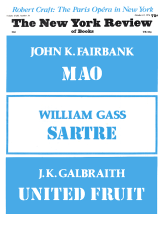In response to:
No Charge from the June 24, 1976 issue
To the Editors:
The letter to the editors (NYR, June 24) from Dr. Louis Jolyon West, one of the defense psychiatrists in the Hearst case, illustrates an essential point very well: that expert witnesses constantly risk becoming partisans.
There is, of course, a good way that a psychiatrist-witness can prevent this happening. It is to be mindful that a jury verdict adverse to his opinion can really be very instructive. After all, psychiatrists do not get much “feedback”: their patients rarely talk back to them, and their students do not often flatly reject their opinions. But, in a jury verdict, the psychiatrist has an opportunity which is almost never available to other professionals: his work is decisively measured by twelve sane, carefully chosen, adult citizens beholden to no one, who have a collective but personal experience in the very subject with which the witness professes to be learned—the human heart and mind. It is not that the jury is always right; it is that it has enough legitimacy that the testifying psychiatrist must recognize that the jury might well be right—and he might be the one who is wrong.
The testifying psychiatrist who remains uninstructed in this may become heavily partisan and seek to vindicate his own opinion rather than to genuinely reassess it. He will persist in calling the substantial evidence which undid his opinion “prejudicial,” while characterizing his own reconstructions as “illuminating.” He is likely to conclude that the verdict bears no hint of the truth and is everyone’s fault but his own: the fault of the public and its “general hostility” to the defendant; the fault of the jury for its “lack of imagination”; the fault of the prosecution for its unfair handling of the evidence; and the fault of the court for its repeatedly improvident rulings.
Dr. West is right about one thing though: as he (surely unwittingly) prefaced his own letter, the Hearst case is, indeed, “a case about which much egregious nonsense has been…written.”
David P. Bancroft
Assistant United States Attorney
Northern District of California
San Francisco, California
Diane Johnson replies:
An expert opinion is, or should be, a considered opinion based on experience, study, research, and judgment, and I see no reason that an expert witness should alter his view just because a jury, whose lack of information and instruction has required his presence in the first place, does not believe or cannot understand him. A jury is there to decide matters of guilt and innocence, not to license ignorance. United States Attorney Bancroft’s suggestion that experts should change their minds to conform to popular prejudices and the government’s views, is not without sinister precedent as far back as Galileo.
Though no doubt appearing partisan to those whom his opinions did not suit, Dr. West was appointed by the court (not the prosecution or defense) to make a disinterested inquiry, and he did so. His subsequent partisanship stems, I take it, from his indignation at seeing what he believes to be injustice. And to object to injustice seems, to me at least, to be the duty of a responsible citizen.
This Issue
October 14, 1976



